News
This Woman Convinces Juries That Blackout Sex & Rape Are Totally Different Things

In the last several years, a handful of sexual assault cases have been propelled into the national spotlight. One woman has dedicated her work to arguing that just because someone is blackout drunk, that doesn't mean he or she can't consent to sex. BuzzFeed recently profiled Kim Fromme, whose expert testimony on sexual assault comes partially from a simulated bar laboratory. But the science surrounding it is murky.
At the University of Texas at Austin, where Fromme has worked for the last 24 years as a professor of clinical psychology, she's dedicated her time to researching the role of consent in alcohol-induced blackout situations. According to BuzzFeed, she's testified, consulted for, or provided depositions for more than 50 criminal, civil, and military cases involving sexual assault since 2009. She's also published more than 100 peer-reviewed studies in scientific journals and served on prominent research boards.
Fromme's research includes a bar simulation laboratory set up at UT Austin. At the bar, graduate students give study participants specific dosages of cocktails and monitor their decision-making in a variety of situations. They use before-drinking and after-drinking tests to see differences in people's behavior from alcohol. There are seven of these kinds of bars throughout the country. However, the bar does not study participants' behavior once they reach a blackout state. As BuzzFeed notes, the bar cuts off participants at the level of legal intoxication. In Texas, that's .08 blood alcohol content.
Yet Fromme continues to testify as an expert in sexual assault cases where the victim has blacked out. According to BuzzFeed, Fromme, like fellow researchers, relies on self-reported data to study behavior during and after blackouts. Researchers survey participants about their experiences with drinking and blacking out, and the data is drawn from their findings.
Although there is usually testing for reliability for surveys, it's nearly impossible to guarantee that participants are telling the complete truth. What has been gathered about blackouts is that 50 percent of drinkers experience blackouts, and it's more common among women.
There are two types of blackouts: "fragmentary," in which the intoxicated person remembers what happened in pieces, but not as a whole, and "en bloc," in which events are not transferred from the short-term memory to the long-term memory. In fragmentary blackouts, you might be prompted to remember part of the night from friends, but with en bloc blackouts, you're not likely to remember anything.
However, according to Fromme, it's impossible to tell when a person is experiencing a blackout, because each person undergoes it at a different blood alcohol level. And others never experience one at all.
In her testimonies — like in the 2013 case in Steubenville, Ohio, where two high school football players were found guilty of raping a teenager — Fromme often focuses on the difference between blacking out while drinking and passing out after drinking. According to Fromme, during a blackout, the person's brain is still functioning, but just does not store long term memories. When passed out, the brain function shuts down.
During the Steubenville trial, Fromme was asked, "if she was sexually assaulted during that blackout, she wouldn't remember, right?" She replied, Yes ... nor would she remember if she consented." She also said that it appeared the victim had made a voluntary decision to leave with one of the defendants accused of raping her, though when presented with photos of the girl being carried by the defendants and photos of her lying naked on a basement floor, Fromme said she had not previously seen those photos.
Although the Steubenville defendants were convicted, she has succeeded in acquitting other sexual assault defendants. A man in Florida was arrested for sexually assaulting a University of Florida student in a field after she left a bar, and two jiu-jitsu students were arrested for raping a teammate on New Year's Eve as she allegedly slipped in and out of consciousness. With Fromme's testimony as part of their defense, the men were all found not guilty.
Fromme has received flack from colleagues, who she says have "shunned" her for testifying for prosecutors on rape and sexual assault cases. During the Steubenville trial, a colleague even tweeted that he was ashamed to work with her at UT Austin.
She's also been criticized for the payments she receives for these testimonies. The BuzzFeed profile highlights that a prosecutor once said to Fromme during a trial, "Is your opinion being influenced by the fact that you're getting paid $10,000 and are trying to help the defendant?" She reportedly said that her fees vary, and BuzzFeed reports that rate is similar to what many expert witnesses receive.
So, Fromme's research in the lab at UT Austin doesn't observe blackout states in participants. And she relies on self-reported data — which can't be guaranteed to be 100 percent accurate — to shape her research on alcohol-induced blackouts.
And yet, she continues to testify as an expert in crucial sexual assault and rape cases, where she argues that a victim blacking out doesn't mean her or she loses his or her ability to consent. According to the BuzzFeed profile, she believes she has an "ethical responsibility to educate" people on blackouts.